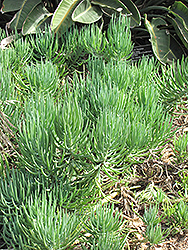It's all about ...
plants

Height: 20 inches
Spread: 30 inches
Sunlight:
![]()
![]()
Hardiness Zone: 9a
Other Names: syn. Curio talinoides, Senecio cylindricus
Description:
An interesting and beautiful succulent variety producing long, narrow powder-blue foliage that reaches upward; a perfect color accent in rock gardens, containers, or massed as groundcover
Ornamental Features
Blue Fingers's attractive succulent narrow leaves emerge bluish-green in spring, turning silvery blue in colour the rest of the year on a plant with an upright spreading habit of growth. It features dainty clusters of white flowers held atop the stems in mid summer.
Landscape Attributes
Blue Fingers is an herbaceous evergreen perennial with an upright spreading habit of growth. Its medium texture blends into the garden, but can always be balanced by a couple of finer or coarser plants for an effective composition.
This is a relatively low maintenance plant, and usually looks its best without pruning, although it will tolerate pruning. It has no significant negative characteristics.
Blue Fingers is recommended for the following landscape applications;
- Accent
- Mass Planting
- Rock/Alpine Gardens
- General Garden Use
- Container Planting
Planting & Growing
Blue Fingers will grow to be about 18 inches tall at maturity, with a spread of 30 inches. It grows at a medium rate, and under ideal conditions can be expected to live for approximately 10 years. As an evegreen perennial, this plant will typically keep its form and foliage year-round.
This plant does best in full sun to partial shade. It prefers dry to average moisture levels with very well-drained soil, and will often die in standing water. It is considered to be drought-tolerant, and thus makes an ideal choice for a low-water garden or xeriscape application. It is not particular as to soil type or pH. It is somewhat tolerant of urban pollution. This species is not originally from North America.
Blue Fingers is a fine choice for the garden, but it is also a good selection for planting in outdoor pots and containers. With its upright habit of growth, it is best suited for use as a 'thriller' in the 'spiller-thriller-filler' container combination; plant it near the center of the pot, surrounded by smaller plants and those that spill over the edges. Note that when growing plants in outdoor containers and baskets, they may require more frequent waterings than they would in the yard or garden. Be aware that in our climate, most plants cannot be expected to survive the winter if left in containers outdoors, and this plant is no exception. Contact our experts for more information on how to protect it over the winter months.
This plant is not reliably hardy in our region, and certain restrictions may apply; contact the store for more information.
